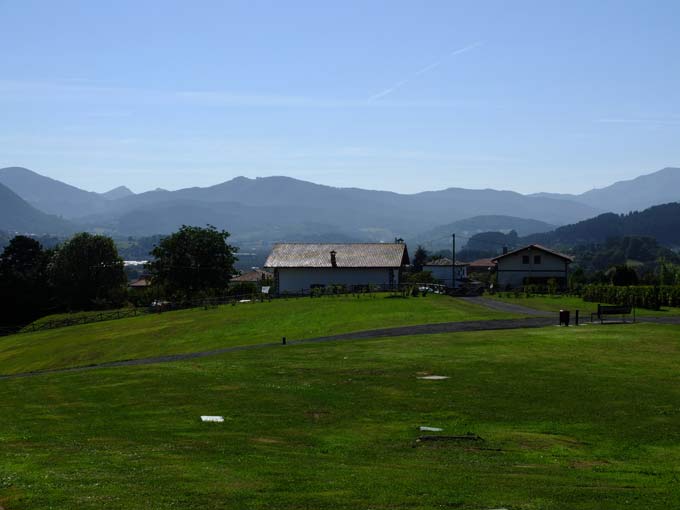
Liam Gillick, Urdabai landscape, Basque Country, 2012.
In 1981, Lieutenant Colonel Antonio Tejero burst into the Spanish Congress and took the podium. Gunshots rang out. A coup d’état was underway. Members of parliament dropped for cover. One of the three who did not was Santiago Carrillo. He sat still, pulled out a packet of Dunhill cigarettes and defiantly smoked his way through the tense hours, waiting for an outcome that was far from clear until the following day.
Carrillo, the smoking parliamentarian and former head of the Spanish Communist Party, died on September 18 of this year, at the age of 97. Affording a long retrospective glance, his passing highlights the Spanish century of civil war, Falangismo, and the transition to democracy.
While in the Basque Country, I spoke at length with my local contact about the legacy of Carrillo’s Spain and the current battles over identity, autonomy and economic survival in the wake of pan-European austerity measures.
The common understanding is that Spain is financially screwed. But the story is actually a political, rather than an economic, one. As with the entire European project at the moment, we are witnessing the repositioning of a federal model that is under various stresses as it seeks to find a way to accommodate historically incompatible systems, profound desires for independence and fiscal autonomy.
The European political situation produces confusion and frustration in equal measure. It is arguable that the Spanish position offers a unique structural picture of broader conditions.
The common understanding is that Spain is financially screwed. But the story is actually a political, rather than an economic, one.
Spain is one of the new countries of Europe, as is Germany, which federalized in 1871 and only assumed its current form in 1990. Greece, too, could only recently be described as “democratic,” with its emergence from the regime of the Colonels in 1975. Spain’s democratic institutions date from the writing of its new constitution, in 1978. Most of Europe consists of ancient identities, yet since the 1970s governmental systems continue to evolve, testing themselves against the concurrent emergence of a truly federal Europe.
Sitting in a 19th-century castle folly in the heart of the Basque Country I spoke at length with my local contact. “I find it really difficult to talk about an abstraction,” he said. “Economics is the highest abstraction.” According to my source, the current crisis is one of financial capitalism itself, which replaces real exchange with speculative value.
“We are all permanently in a bubble, worldwide since the explosion of neoliberalism and the deregulation of the banking system.” He is not alone in these thoughts. In the region his is a common, if less clearly articulated, position. And no amount of German requests to tighten belts will decrease the resistance to a way of thinking about economics that so many find intolerable.
“I would say that the problem with economics right now is that the economists don’t know what is going on either. Even if they have the terminology to express the situation they don’t understand how economics works. So, I don’t know.”
“Every single bank in Spain had politicians on the boards,” my contact added. “For example, the reason corruption has been stronger in Valencia and Murcia is because politicians were using tons of money from banks for various speculative and ridiculous projects.”
But surely they thought they were building better regions, I asked.
“But the problem with financial capital is that it is not real money, it is virtual money. It is a fiction. There are lots of examples in Spain of highly speculative uses of money where the money does not provide any benefit. Every single bank had politicians on the board and there was a constant corrupted deal within the banks. It depends where you are in Spain. It is not a universal problem. I am very shocked about Catalonia asking for a rescue.”
This situation of crisis is creating new political potential. If you ask for a bailout for the autonomous region of Catalonia, you thereby suggest: If the money is not there, then let us go our own way. On September 11, Catalan National Day, more than a million people took to the streets of Barcelona to demand independence from Spain, in the largest such demonstration to date.

Liam Gillick, Cat, Gernika, 2012.
“Suddenly there is a chain linking the facts together,” my contact says with a smile, “between politics, economics and the desire for the creation of independent states free from Madrid and operating as autonomous countries within the European Union.”
The Basque Country seems lucky at the moment. Some claim it is in the character of the people; true or not, the community certainly has autonomous institutions that protect the land from the worst of the crisis.
“There have not been corruption cases in the same way here. Everything is more controlled and the banks are healthier, even if you never know.” Whatever the case, the economic crisis dominates the thoughts of Spanish people living in the various “lands” today.
It is commonly believed that the media has stoked the fires of fear, presenting the worst-case scenario as if it were about to come true, scaring people who have no shares, property or large bank balances. It is all thought to be part of a process to soften up people for the advent of a northern European model of heavily enforced taxes and a concurrent reduction in regional fiscal autonomy.
The view from this side of the Atlantic is that a group of anonymous technocrats have taken over from Greece, via Italy, to Spain.
“For the last few years, all the news has been dominated by the financial crisis. So the media plays a strong role in all this. A lot of the problem is related to the media and the effect that the media is creating and these effects have some impact outside of Spain. Especially in the rest of the European Union…I cannot really believe the extent to which they are creating fear through the media. Month after month, getting worse all the time.”
Of course there has been a permanent economic crisis since I was born, with the Clinton-Blair years representing rare good times for a few. In Britain in the early 1970s, the power was out every week, and a three-day workweek was introduced, soon followed by a systematic attack on working people with the rise of Thatcher and Reagan. The Labour party got lazy and ended up fighting the public service unions, leading to crisis and paving the way for the Thatcher catastrophe, with its deregulation and its massive redistribution of wealth from poor to rich.
We are seeing the same thing play out today in Spain, accompanied by massive demonstrations against public-sector cuts taking place most recently in Madrid. As in Britain thirty years ago, the police turn their backs to the banks and bureaucracy and face off against the crowd.
Few on the Left took the Thatcher threat seriously.
“Just a short while ago, no one in Spain could foresee the current situation,” explains my contact. “It took place little by little, with the media playing a crucial role. There was a turning point last year with the elections.”
My contact does not see the same ideological games today that he did during the neoliberal takeover in the 1980s.
“Already a couple of years before the elections the news about the crisis was growing. At that point the Socialist Party ran Spain and the right wing accused it of starting the crisis. This is the classic situation. The Socialists were blamed. But it was a global bank crisis based in the crisis of the credit system. The Right used that tool in order to change the situation.”
For the first three months the Right did nothing. The new Prime Minister, Mariano Rajoy, is totally faceless, lacking charisma. The view from this side of the Atlantic is that a group of anonymous technocrats have taken over from Greece, via Italy, to Spain—all across the southern Mediterranean there has been a not-so-stealthy takeover of power.
In many ways the “crisis” in Spain is a unique micro-model of the whole European crisis.
“A Euro-Vegas will be built in Madrid, investing a lot of money with the idea that it will create more money. That’s the basis of neoliberalism.”
A couple of hours north of New York all the roads seem to be getting a thin crispy layer of new blacktop. Stimulus in New York — Las Vegas in Madrid.
“The whole model of Spain is seriously threatened by the situation itself and it affects not only the Basque Country but the rest of the regions as well. It is not just about Catalonia and the Basque Country, as most people imagine. The rest of the provinces have degrees of cultural autonomy. Andalusia has quite a lot of autonomy.”
In many ways the “crisis” in Spain is a unique micro-model of the whole European crisis. Sensational media reports of impending chaos have led to technocrats—who are sympathetic to the banking system rather than social structures—taking office. This is all part of a crisis of federalism, which has resulted in calls for resistance and an increasing dismissal of the entire project of central control.
Santiago Carrillo was from the old school, a Communist who stuck to his position until the very last. When faced with collapse of the State after the death of Franco, he worked hard to accommodate both collectivity and progress—but the overriding memory was of one who sat fast, unflinching in the face of inarticulate power grabs, quietly smoking and waiting for things to work out.
Today’s Spain consists of many lands with substantial autonomy, including Catalonia and the Basque Country, which would prefer to be truly independent under the European umbrella. In this sense, Spain is showing the way the rest of Europe might head. Here we can simultaneously see many signs, new directions and dead ends.

